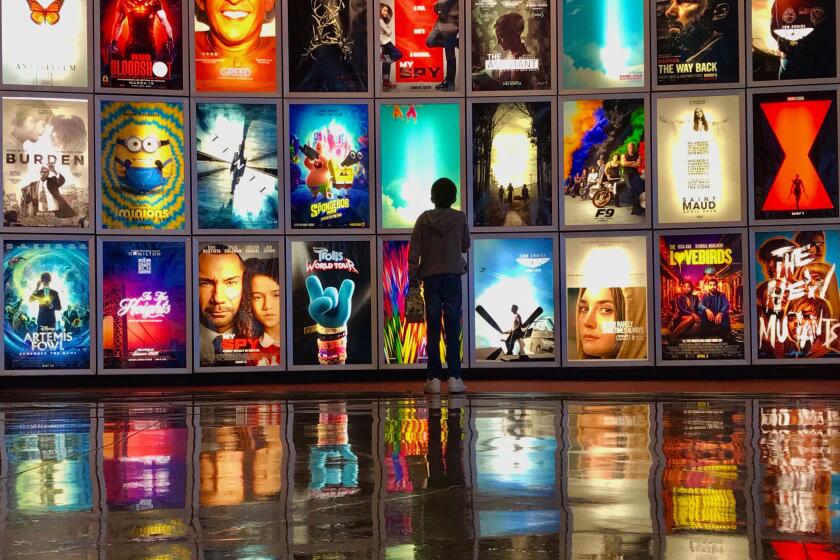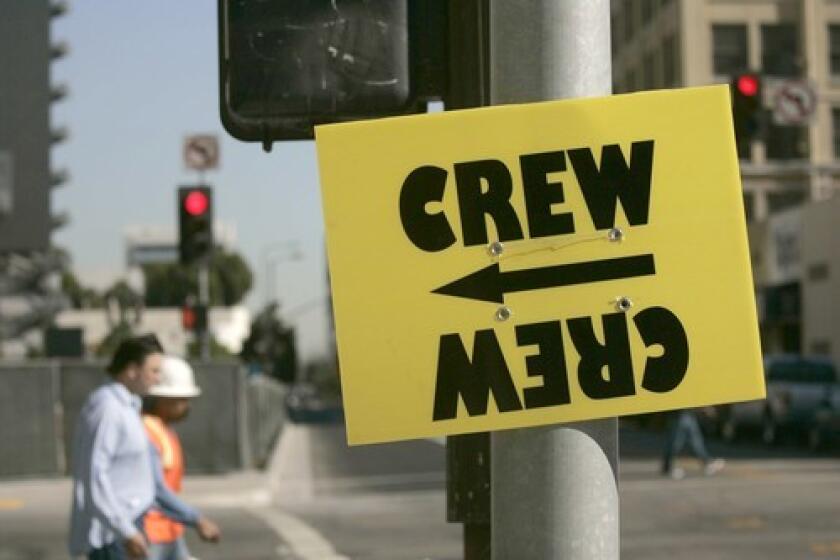Hollywood productions react to the coronavirus threat: ‘No job is worth endangering people getting sick’
- Share via
For decades, films and TV series have served up countless imaginary catastrophes that have brought the planet to its knees, from natural disasters to alien invasions to, yes, rampaging pandemics. But as the world grapples with the rapidly growing coronavirus crisis, Hollywood is finding that reality is far more frightening.
In a mere matter of days, the industry, like virtually every other part of the global economy, has been brought to a veritable grinding halt. Faced with the prospect of a box office bloodbath as audiences hunker down in their homes, studios are scrambling to shift back the release dates for some of their biggest upcoming films, including Universal’s summer tentpole “F9,” which has been pushed back nearly a year to April 2021, Disney’s “Mulan,” which has been postponed indefinitely and MGM’s fittingly titled James Bond film “No Time to Die,” which has shifted from April to November.
Meanwhile, industry events across the country are being canceled at a furious clip, including Austin, Texas’ South by Southwest festival, Las Vegas’ theater owners’ confab CinemaCon and New York’s Tribeca Film Festival, with many fearing that May’s Cannes Film Festival will be next.
As if all that weren’t anxiety-provoking enough, Tom Hanks — arguably the industry’s most beloved figure and a man who has often been called the mayor of Hollywood — announced Wednesday that he and his wife, Rita Wilson, had contracted the coronavirus in Australia, where Hanks is in pre-production on director Baz Luhrmann‘s Elvis Presley biopic.
With public health officials and government leaders urging drastic social-distancing measures to limit the spread of the virus, those who work on film and television sets have been feeling anxious and shell-shocked. Most crew members and below-the-line actors work from job to job, often not knowing where or when the next project will come along. Unlike many others across the economy, they generally can’t simply work from home to protect themselves and their loved ones. And if a single key member of the cast or crew gets sick, millions of dollars could be at stake.
Working on sets for months at a time is a pretty unnatural social experiment as it is. There’s no quarantine-friendly version of making a film.
— Gabriela Cowperthwaite
“With feature films, our entire industry relies on people being in close proximity to one another, day after day on sets,” says director Gabriela Cowperthwaite, who has directed documentaries like “Blackfish” as well as narrative features. “You can’t choose to observe some 6-foot rule. Overall, working on sets for months at a time is a pretty unnatural social experiment as it is. There’s no quarantine-friendly version of making a film.”
A number of productions, both in Los Angeles and elsewhere around the globe, have already been affected by the pandemic, with more being announced every day, if not every hour. Disney shut down filming in Prague, Czech Republic, of the Marvel Studios series “Falcon and the Winter Soldier” for Disney+, while Warner Bros., which is producing Hanks’ Presley film, released a statement that “it was taking precautions to protect everyone who works on our productions around the world.” Apple TV+ announced that its flagship drama series “The Morning Show,” starring Jennifer Aniston and Reese Witherspoon, would take a two-week hiatus from filming on the Sony lot while it assesses the situation.
Since the outbreak began to intensify, many film and TV productions stepped up preventive measures, encouraging frequent hand washing and providing sanitizer to cast and crews. Safety meetings now regularly include warnings to avoid shaking hands and to report any flu-like symptoms. Still, among the production community at large there remains rampant confusion over best practices and deep uncertainty over potential lost wages if productions are suddenly halted.
Films are getting pushed. CinemaCon has been canceled. Stocks are rattled. What’s next for the entertainment industry?
Faced with the double whammy of the virus’ spread and the resulting economic peril to workers, unions are grappling with how to protect their members.
“Our focus now is the safety of our members working on sets and in newsrooms around the country and in various locations around the world,” a spokesperson for SAG-AFTRA — Hollywood’s biggest union, representing 160,000 actors and performers — said in an emailed statement. “We are working with employers, sister unions and allies throughout the industry to respond to this rapidly changing situation.” Trustees of the SAG-AFTRA health insurance plan announced Thursday that all costs for coronavirus testing at in-network facilities would be waived for participants.
In this climate, even a TV show’s writers room could be seen as a potentially hazardous work environment. “Our representatives are in close contact with all of the shops where our members are working,” Lowell Peterson, the Writers Guild of America East’s executive director, said in an email. “Our scripted writing rooms so far remain up and running (drama and comedy) but we will see how long that continues. We are encouraging our members to let us know if they have any concerns about their safety in this difficult period.”
Some showrunners are already getting in a work-from-home mode. As of Wednesday morning, the writers of Sony’s “One Day at a Time” were already brainstorming story ideas for the upcoming fourth season remotely through Skype and Zoom.
The sitcom’s co-showrunners, Gloria Calderón Kellett and Mike Royce, made the decision midday Tuesday. The pair called the upper-level writers by phone and emailed everyone else with assignments they could work on from home.
“In an abundance of caution, we figured we could conduct our rewrite from home via Skype or Zoom,” Kellett told The Times from home. “It seemed like it wouldn’t be hard for us to do our work. We are on hiatus, so we can actually get everything we need done from home.”
But some feel that the gravity of the crisis calls for more drastic action. “I think across the board we should be shutting stuff down until we understand what this virus can do,” said Richard Shepard, who is a producer and director on FX’s upcoming series “American Crime Story: Impeachment.” “They need to put a one-month hiatus [on production]. Film sets are crazy intimate places with hundreds of people in enormously close proximity. They’re incubators for viruses. Makeup [artists] are touching people’s faces, dressers are clothing extras, prop people are handing props or food to the actors. It’s just so intimate.”
At the same time, particularly for those who work on smaller projects, the financial consequences of shutting down projects even temporarily could be severe, and it’s far from clear who will foot the bills.
Film crews in Los Angeles are starting to face restrictions on filming in the city as legislators seek to halt the spread of coronavirus.
“I feel for the independent filmmakers and the independent producers right now who are having to make the hard choice between what their insurance will cover and what the health and safety of their crew might dictate,” said one L.A.-based director and producer, who declined to be named due to the sensitivity of the subject. “You’re looking at $100,000 losses for a day of production if you make that call on your own, even if it’s the right call to make. That’s the rock and a hard place that people are up against, especially in a small business where you only have a few films a year that are making the company run and you’re not a big studio.”
With new travel restrictions and hot zones being announced daily, those preparing for upcoming shoots don’t know if their scheduled projects will — or should — proceed as planned.
“We’re doing a [documentary] that involves traveling to Africa, and that’s been canceled because of what we might be bringing in,” says Cowperthwaite. “In documentary, so much of our work involves dispatching to remote places and bringing light to an issue. The thought that we unknowingly might be wreaking havoc on a remote, vulnerable area while doing this — that’s the frustrating irony.”
Going forward, those shepherding projects both large and small will face a daunting challenge as they weigh concerns over potential health risks with certain financial pain. But to many on the front lines, that’s an easy call.
People feel scared for everyone showing up in that work environment but also worried about people getting paid and whatnot. I don’t know what those answers are.
— Jesse Peretz
“Last week, I was on set of a studio project saying, ‘This is crazy,’ ” says director Jesse Peretz, who works primarily in television. “People on that set were concerned and there was sanitizer everywhere. I was honestly counting down the days until I could get off. People feel scared for everyone showing up in that work environment but also worried about people getting paid and whatnot. I don’t know what those answers are. But between Netflix, Amazon, Warner Bros., Fox — I’m pretty sure they’ve got the financial resources to pay people and get six weeks behind in production. I think it’s a moral imperative that they step up to the plate and not be responsible to adding to what is a pretty miserable health crisis.”
“I feel like no job is worth endangering people getting sick about,” Shepard says. “I’m not suggesting we should just do this blindly. But in times of crisis, leadership is important. If anyone in a production is nervous about something, that has to be taken seriously. If this goes like in Italy, we won’t be shooting in a month — we’ll be shooting in a year, if we’re lucky. We’d better to be proactive now.”
Times staff writers Amy Kaufman, Anousha Sakoui, Yvonne Villarreal and Jen Yamato contributed to this report.
More to Read
Only good movies
Get the Indie Focus newsletter, Mark Olsen's weekly guide to the world of cinema.
You may occasionally receive promotional content from the Los Angeles Times.













